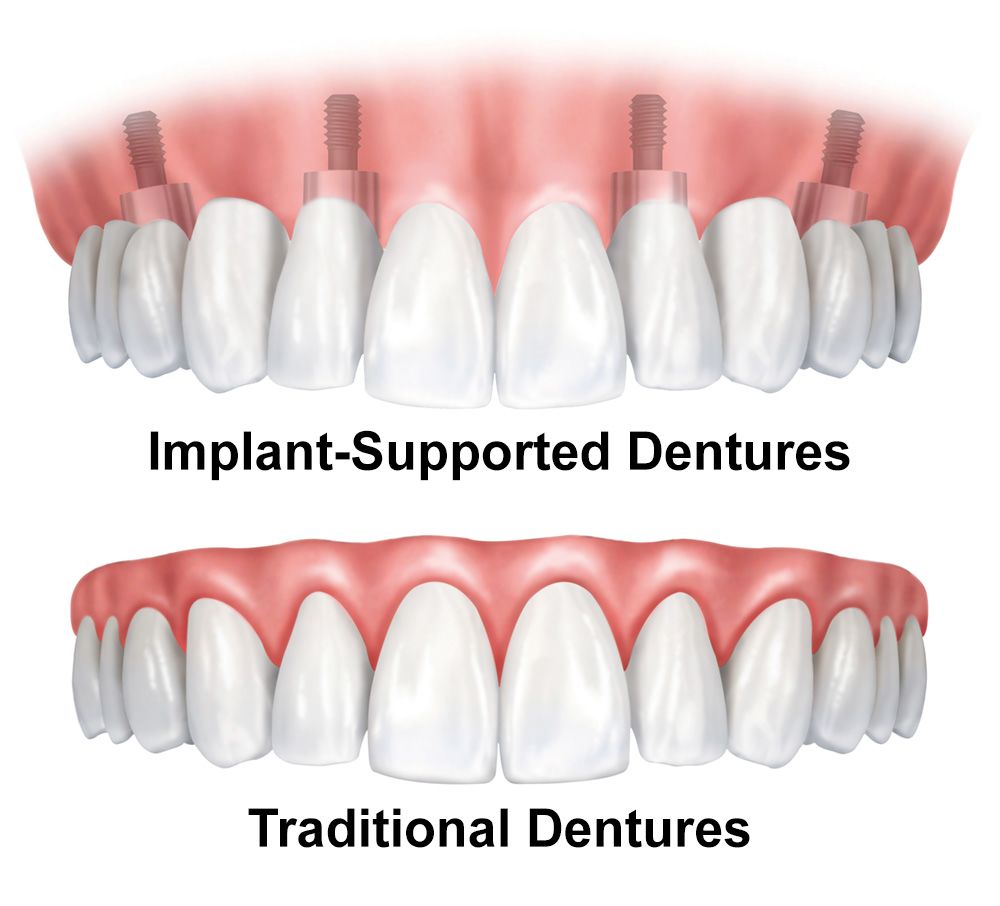Traditional vs. Implant-supported Dentures
 If you are missing all or most of your teeth, you probably know that dentures are the most suitable treatment option for your needs. Dentures consist of one or more artificial teeth that can fill in the space left by missing teeth. What you may not know is that you have the choice of being fitted with traditional dentures or implant-supported dentures. Each of these types of dentures has their own benefits and drawbacks. At Bell Dental, Dr. Brian Bell and Dr. Justin J. Crocker explain the differences between traditional vs. implant-supported dentures. To find out which is best for you, contact our Lake Jackson, TX practice today.
If you are missing all or most of your teeth, you probably know that dentures are the most suitable treatment option for your needs. Dentures consist of one or more artificial teeth that can fill in the space left by missing teeth. What you may not know is that you have the choice of being fitted with traditional dentures or implant-supported dentures. Each of these types of dentures has their own benefits and drawbacks. At Bell Dental, Dr. Brian Bell and Dr. Justin J. Crocker explain the differences between traditional vs. implant-supported dentures. To find out which is best for you, contact our Lake Jackson, TX practice today.
Traditional Dentures
Traditional dentures have an acrylic base, which is made to resemble your gum tissue. The appropriate number of artificial teeth is attached to the base, so when the dentures are placed in the mouth, it appears as though the patient has a full set of teeth.
Traditional dentures rely on the fit of the prosthesis, suction, and dental adhesives to remain in place. At Bell Dental, we find that the fit and quality of dentures is critical; by working closely with patients and taking precise measurements, we can fabricate high quality dentures that fit comfortably and stay in place.
Benefits of Traditional Dentures
Traditional dentures offer a number of benefits to patients, including:
- The treatment is non-invasive and does not require surgery
- The treatment process is quick; in many cases, patients have their custom dentures in a matter of a few weeks
- The procedure is less costly
- Dental insurance typically covers most or all of the costs of traditional dentures
Drawbacks of Traditional Dentures
There are some disadvantages associated with traditional dentures. These include:
- As the jawbone and gum tissue change in shape, traditional dentures may require denture realignment
- Traditional dentures are not considered as stable as implant-supported dentures
- Traditional dentures do not prevent the deterioration of the jawbone, which occurs after tooth loss
Implant-supported Dentures
Instead of relying on fit, suction, and adhesives, implant-supported dentures are held in place with dental implants. Dental implants are surgically implanted into the jawbone. During the next three to six months, the implants integrate with the surrounding hard and soft tissues of the mouth, similar to how the natural roots of the teeth are anchored within the mouth. The dental implants can then be used to hold restorations, such as dentures, in place.
Advantages of Implant-supported Dentures
Implant-supported dentures offer a number of benefits when compared to traditional dentures:
- They do not slip out of place, even when eating hard or crunchy foods
- They provide a greater sense of security
- With proper care, the dental implants themselves will last a lifetime
Disadvantages of Implant-supported Dentures
Implant-supported dentures are associated with some drawbacks, including:
- The treatment requires a surgical procedure so the implants can be placed
- The total cost of treatment is higher
- Dental insurance may only offer partial coverage
- Dental implant failure is a possibility; common causes of implant failure include poor oral hygiene and smoking
To find out if traditional or implant-supported dentures are right for you, contact Bell Dental today.



